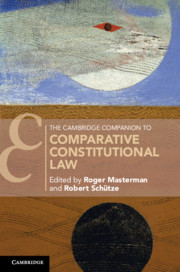Book contents
- Reviews
- The Cambridge Companion to Comparative Constitutional Law
- Cambridge Companions to Law
- The Cambridge Companion toComparative Constitutional Law
- Copyright page
- Contents
- Notes on Contributors
- Acknowledgements
- Table of Cases (Selection)
- Abbreviations
- Introduction
- Part I Theoretical Foundations
- Part II Historical Experiences
- Part III Constitutional Principles
- 8 Democracy
- 9 Separation of Powers
- 10 The Rule of Law
- 11 Human Rights Law
- 12 Federalism
- Part IV State Institutions
- Part V Transnational Constitutionalism
- Index
- References
12 - Federalism
from Part III - Constitutional Principles
Published online by Cambridge University Press: 30 September 2019
- Reviews
- The Cambridge Companion to Comparative Constitutional Law
- Cambridge Companions to Law
- The Cambridge Companion toComparative Constitutional Law
- Copyright page
- Contents
- Notes on Contributors
- Acknowledgements
- Table of Cases (Selection)
- Abbreviations
- Introduction
- Part I Theoretical Foundations
- Part II Historical Experiences
- Part III Constitutional Principles
- 8 Democracy
- 9 Separation of Powers
- 10 The Rule of Law
- 11 Human Rights Law
- 12 Federalism
- Part IV State Institutions
- Part V Transnational Constitutionalism
- Index
- References
Summary
The term ‘federalism’ refers both to a plurality of historical experiences, and features both a static-structural and a dynamic-procedural dimension. The first dimension refers to the concrete organizational forms assumed by federalism (such as in the United States or India); the second dimension, on the other hand, concerns federal processes, that is to say the historical evolution and the progressive development of a union between several communities (for example, the European Union or the United Provinces of the Netherlands in the modern era).
- Type
- Chapter
- Information
- Publisher: Cambridge University PressPrint publication year: 2019

